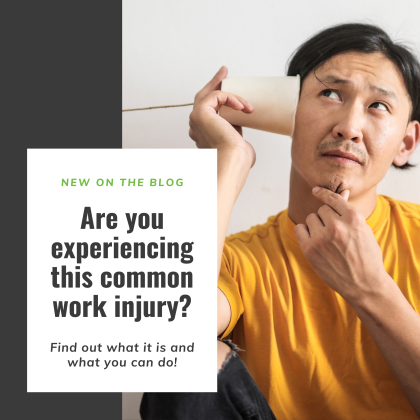Are you experiencing this common work injury?
February 26th 2022
 Are you experiencing this common work injury?
Are you experiencing this common work injury? Do you work in a noisy environment? Do you find yourself having trouble concentrating if there are multiple people talking or if there is a lot of background noise (printers, phones ringing, keyboards clacking, doors opening and closing)? Do you often ask your coworkers to repeat themselves? If so, you might be experiencing hearing loss, one of the most common work-related injuries. In the US, untreated hearing loss can decrease one’s annual income by as much as $30,000, and individuals with hearing loss also experience greater difficulties in employment transition and career development, compared with those with typical hearing.
WHAT CONTRIBUTES TO HEARING LOSS?
According to Ears Canada, ask yourself: "Do I enjoy hobbies or recreation which are surrounded by loud noises? How do I like to spend your weekends? Fast cars, snowmobiles, live music maybe. If so, you could have hearing loss simply from prolonged exposure to these noises. Those aren’t the only factors. Genetics, injury to the ear, medications can all play a role in hearing loss."
COVID-19 also continues to play a role in the increasing number of people who are diagnosed with hearing loss. The use of masks creates additional challenges for individuals who are deaf and hard-of-hearing and New research suggests that wearing a mask attenuates or reduces the volume of sound by 10-20 dB, decreasing the overall volume and clarity of speech. "In addition to making speech less clear, masks prevent individuals from being able to use visual cues, such as lipreading, to supplement what they are hearing. Many individuals who are deaf or hard-of-hearing have taken to social media and other online sources to bring awareness to the additional communication challenges that masks create for them." And with so many people now required to spend 8+ hours a day in an environment where you are required to wear a mask, such as an office, warehouse, or retail/service environment, it's easy to understand how hearing loss may be affecting many more of us than before.
WHAT CAN I DO AT WORK?
The National Institute for Occupational Safety and Health (NIOSH) recommends that workers are not exposed to noise at a level that amounts to more than 85 decibels (dBA) over 8 continuous hours. NIOSH estimates that 30 million U.S. workers are exposed to noise levels high enough to cause irreversible hearing loss.
The first step is taking steps to prevent hearing loss such as turning volumes down, minimizing expsoure to loud noises and prolonged periods of high decibal sounds, encouraging empathy-driven communication can also help you as well those who may be experiencing hearing loss. When trying to communicate with someone, Ears Canada recommends you:
•Face the person you are speaking to
•Ensure you are having a conversation in an area where there is good lighting so that the light falls on your face
•Minimize background noise as much as possible
•Re-phrase what you are saying instead of repeating the same words
•Do not shout or over-articulate – speak clearly and allow for occasional pauses in your speech
•Have information available in written form to prevent communication misunderstandings
Use a text-to-speech transcription app on your phone
SIGNS OF HEARING LOSS
According to the CDC, here are some other signs of hearing loss to look out for:
- Speech and other sounds seem muffled
- Trouble hearing high-pitched sounds (e.g., birds, doorbell, telephone, alarm clock)
- Trouble understanding conversations when you are in a noisy place, such as a restaurant
- Trouble understanding speech over the phone
- Trouble hearing speech consonants (e.g., trouble hearing the difference between s and f, between p and t, or between sh and th in speech)
- Asking others to speak more slowly and clearly
- Asking someone to speak more loudly or repeat what they said
- Turning up the volume of the television or radio
- Ringing in the ears
- Hypersensitivity to certain sounds (certain sounds are very bothersome or create pain)
Interestingly, hearing aids have been shown to reduce the risk of income loss by 90 to 100% for those with milder hearing loss, and from 65 to 77% for those with moderate to severe hearing loss. If you or someone you know thinks they may be experiencing hearing loss, BarterPay Member Ears Canada can help! Reach out to us and we'll connect you with them for a consultation. They can provide hearing assessments and walk you through your options for hearing devices. You can learn more about their services at https://earscanada.ca/